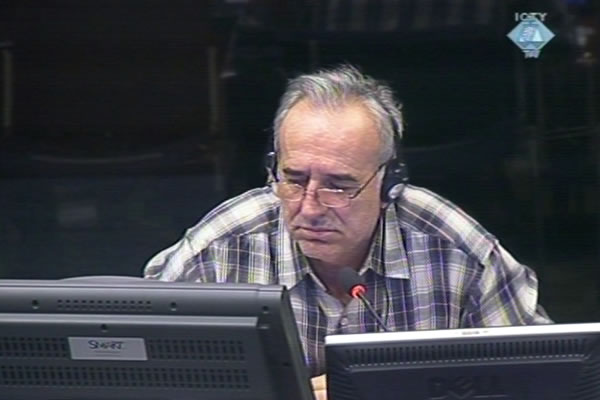Home
KARADZIC BLAMES ‘PERSONAL VENDETTAS’ AND ‘NON-PROFESSIONAL ARMIES’
In his cross-examination of security officer in the Bratunac Brigade Momir Nikolic, the accused Radovan Karadzic insisted that ‘personal vendettas’ and the fact the war was not fought by professional soldiers but by people who had taken up arms led to the Srebrenica tragedy in July 1995
 Momir Nikolic, witness at the Radovan Karadzic trial
Momir Nikolic, witness at the Radovan Karadzic trial Former Republika Srpska president Radovan Karadzic cross-examined former security officer in the VRS Bratunac Brigade Momir Nikolic. Karadzic tried to prove that ‘personal vendettas’ and the fact that the war was fought not by professional troops but people who had taken up arms contributed significantly to the Srebrenica tragedy in July 1995.
Nikolic said he ‘would prefer not to engage in this kind of speculation’. According to him, there was no causal relationship between what Karadzic was speaking about and the events in the Srebrenica enclave in the summer of 1995. As Nikolic noted, there were cases of vendetta on both sides, but these were ‘isolated cases that had nothing to do with what happened in Srebrenica and Bratunac’ in mid-July 1995.
Karadzic dedicated a good part of his cross-examination to the events at the beginning of the conflict in 1992, and the arrival of the volunteers in the Bratunac area. As Karadzic put it, at one point, these volunteers ‘went rogue’ and started abusing first the Muslims and later, ‘when there were no more Muslims’, they turned on the Serbs.
Nikolic described in much detail the arrival of the ‘White Eagles’, ‘Arkan’s men’ and other groups of ‘criminals, repeat offenders, sick people and psychopaths’, as he described them, who were guilty of the ‘greatest evils’. According to Nikolic, the so-called ‘instructors’ who had been invited in to train the local soldiers in policing and scouting skills were responsible for the ‘reign of terror’ in 1993. Soon afterwards, the instructors set up their own units and controlled all aspects of life in the town, physically abusing both civilian officials and military officers.
When the judges then asked Karadzic to explain the relevance of this line of questioning, he replied that during his proofing, Nikolic said the events in Srebrenica in July 1995 were the result of hatred, ‘not just hatred engendered in this war but also from earlier wars’. According to Karadzic, Nikolic said that hatred ‘motivated the actions of individuals, groups and perhaps even commands’. Karadzic added, ‘I don’t intend to justify the events but to help everyone understand what happened’ in Srebrenica. Prosecutor Nichols stood up and explained that hatred was indeed mentioned at Nikolic’s proofing session, but the part about hatred being the motive behind the actions of individuals, groups and perhaps even commands was Karadzic’s addition, the prosecutor emphasized.
Karadzic brought up other events, including the Serb offensive on Srebrenica in early 1993. Karadzic claimed credit for stopping the offensive, saying that he ordered the offensive to stop despite the fact that it was a very ‘unpopular move’ at the time. He did it in the face of the objections of many military commanders.
The accused showed the witness a series of documents about humanitarian aid deliveries, claiming that the authorities in Srebrenica said they needed food for 45,000 people, while in actual fact several thousand less people lived in the enclave. Karadzic put it to the witness there was enough food for the civilians in Srebrenica, but that the army requisitioned a significant portion of the humanitarian aid. Instead of focusing on growing produce, the soldiers held their lines and were ‘not productive’, Karadzic argued. Nikolic replied that according to the estimates he had at the time, about 40,000 to 45,000 people lived in Srebrenica. The quantities of food arriving in the enclave were not sufficient, Nikolic countered.
Karadzic has about two and a half hours tomorrow to complete his cross-examination of Momir Nikolic, the first VRS officer to plead guilty to the crimes in Srebrenica.
Linked Reports
- Case : Karadzic
- 2012-02-14 THE ONLY QUESTION WAS WHERE TO EXECUTE THE PRISONERS
- 2012-02-13 MOMIR NIKOLIC: HOW ‘EVIL’ IN SREBRENICA WAS PREPARED
- 2012-02-10 HOW DERONJIC SAVED THE HONOR OF BRATUNAC
- 2012-02-16 KARADZIC AND ‘LAWS OF CHAOS’
- 2012-02-21 MASS MURDERS WERE NO SECRET ON EITHER SIDE OF DRINA RIVER
- 2012-02-22 KARADZIC’S AND MLADIC’S GIFTS TO THEIR ‘BROTHER’ IN CANADA
